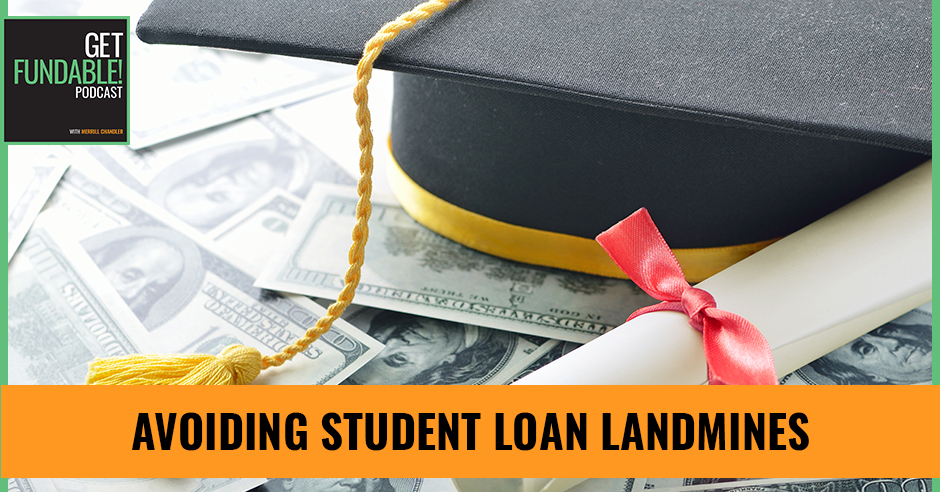
Student loans are designed to help students pay for post-secondary education and other associated fees. It can come from the federal government, private sources such as a financial institution, a bank, etc. Below, Merrill Chandler shares how student loans contribute to not only your fundability™, but your installment loan portfolio and entire borrower profile as well! More importantly…he explains the dangers of the many landmines associated with these student loans, and the mistakes that we easily make if we don’t pay close attention—both while going into student loans while they’re in deferment and also coming out.
—
Watch the episode here:
Listen to the podcast here:
Avoiding Student Loan Landmines
This is an important topic that many people need to learn about…since most college students will—at some point—need a loan! We are going to be discussing how parents and/or their children can avoid student loan landmines with the right steps. Because of the fact that there are countless misconceptions surrounding these loans…let’s begin! It is very essential to learn about how student loans contribute to a good installment loan portfolio, your entire borrower profile, and your fundability™ as a whole! And to add on to that…every individual dealing with student loans should be more than aware of the landmines associated with them and the common mistakes that can easily be avoided—no matter if you’re going into them while they’re in deferment, or coming out. With this topic…there could be a drastic landmine at every step you take. Whether you are a parent trying to protect their child from financial mistakes, or a college student yourself, I want you to obtain this knowledge so that you know how to succeed and not get stuck in one big trap!
We are going to cover several areas below. In fact, there are so many that I felt the need to craft a checklist about this subject matter! If you would like to see it for yourself or even print out a copy of it, go to GetFundableStudentLoansChecklist.com and check it out. This checklist will also help you as we move through the different aspects, because I’m telling you right now…there is almost too much interesting information to go over! No matter where you are in the process of receiving or paying off your loans, we are going to discuss what you need to watch out for, what to be careful of, and what you need to know before paying them off. The checklist mentioned above also includes a list of student loan forgiveness programs and links! A lot of people don’t know what they are actually doing while they evaluate student loans. In reality, there has always been a dense cloud of confusion around this topic, which is why I want tell you what you’re really up against.
If you're talking to a financial aid at the school on the phone or in person, you need to make sure you're making the right call. All of this is in the student loan checklist on the Get Fundable website #GetFundable Share on XFederal Loans
To begin with the basic facts…there are two different types of loans: federal and private. Federal, as many of you might have guessed from the name alone, are federally-back student loans. They can be delivered directly from the federal government, while others are labeled as federal even though they are from companies like Chase or Bank of America. It’s always a good idea to act carefully when you are comparing and contrasting federal loans from private loans, because there are countless private organizations that give them out. For example, even SoFi (a financial technology company) is offering student loans…but they are not federally guaranteed.
This is a big, make-or-break factor! If they’re not federally guaranteed, there are a lot of restrictions to them. Even if they offer deferment, it’s still just a regular loan that might not have the same features. This shows you that when people think about all of the benefits that come from student loans…they are almost always talking about the ones that are federal. Another name for a federal student loan is a direct student loan, and there is a bunch of questions that you should ask them for any type of loan application.
You need to examine it to find out what is actually included in the offer. Federal, private, direct, etc. can all be used as keywords during this process in order to discover the truth. Whether you’re talking on the phone with a financial aid worker or meeting them in person, always ask what type of loan it is. Remember, federal (or direct) means that the loan is back by the government. So if you find out that the loan is in fact federal, the very next question you need to ask should be something like, “Will it be deferred while I’m in the middle of my education? Or do I have to start paying for it immediately?”
To put it in more simple terms, another option would be asking, “Is it deferred upon the termination of the final class?” Some are deferred for six months until after you finish your classes…but since they are all different, your situation will always depend on the specific loan. This is why the act of asking questions is so important! Other than asking if it is in deferment, other questions to bring to the table should be examples like, “When will the deferment start?” Or, “What’s the class load I need to take in order to keep it in deferment?” Some are only part-time, while others can be full time (8-12 hours). Some of these federally-backed loans may go down to as few as six hours just to stay out of deferment! Always keep in mind the terms, status, and conditions of payment for your deferment.
If you happen to be a real estate or business entrepreneur, you need to know that—if you are doing this for your children—you will become something known as an endorser. An endorser is the parent, grandparent, or any other type of guardian who is co-signing on the loan. And before you take on this role, educate yourself on what exactly the responsibilities are. Trust me, I have heard thousands of client stories throughout my career…and running into problems or traps involved with student loans is probably the biggest pain of them all because of the many factors they were unaware of while going into the process!

Student Loan Landmines: Your current balance cannot be higher than your loan amount.
One of the mistakes that I see often is when parents think being an endorser is completely different from being a co-signer. A parent will become their child’s endorser, but then later down the line…they’ll wonder why they got a 30-day late while their kid is trying to pay off their own loan. Being an endorser literally means that you are a co-signer/co-borrower…even though they sound like different things. You will be responsible for the entire balance of the loan, and for making sure that your kid is making the payments on time. You and your profile are also at risk if there happens to be a late payment or otherwise. But don’t worry…there are a few ways to protect yourself throughout this process that we will get to in just a moment!
What To Do While Your Loan Is In Deferment
During this period, some people will ask how long they need to keep the loan—mostly because they want to pay it off! If you have attended my Bootcamp or Mastermind sessions…you know that you will get the most points by allowing to pay on those student loans for 24 months, which will get you through the 24-month look-back period. This will also equip you with a solid payment history before you go to pay it off. Now, I’m aware that some people gift their children with the payment of a student loan. That is just one example of the countless kinds of situations that people can run into. But no matter what…the best situation to be in (fundability™-wise) is both the student and parent get that recorded for the full 24 months. And then, after that period of time, you can pay it off if you have the means to do so! Continuing to make the 24 consecutive payments is a very important factor.
During the engagement of the loan, a helpful question to ask is, “What does the credit score of the student borrower need to be for the endorser to get removed?” They do in fact have programs—especially federally-backed ones—where, after a certain number of payments, the endorser can be removed…but it will vary by the specific lender or program. Because of the uncertainty, it’s always a vital question to ask. This is actually in the checklist that you can download at GetFundableStudentLoansChecklist.com. That checklist contains the outlines for how to prepare and what you need to ask about a loan to know the terms that you’re under before you engage in it. As you might know, the administration for Covid has extended the student loan moratorium, with the 0% interest being applied. They’ve extended this through December 31st of 2020. The thing we need to have dialed in and where we’re on the bullseye is how do we treat the student loan while it’s in deferment.
This is crucial information, especially if you’re trying to find out what you should do while your loan is in deferment. You have to ask the question, “Am I accruing interest while it’s in deferment?” While certain ones do, others don’t do it during deferment when the six-month program starts. They actually start accruing after those six months, or from the time when you terminate the term of your education. But during that six-month period…they may be applying interest! This is the exact reason to ask your student loan provider what you should be doing during the deferment period. If they are accruing interest (just as many do), most of us don’t understand that the interest will continue accruing throughout your four years of schooling.
For example, if you are dealing with a $10,000 loan. On your borrower profile, it will not only show that the $10,000 was the original loan amount…but also how the current balance is continuing to grow from $11,000, $12,000, $13,000, and so on. The general public has no idea that the percentage you grow above the original loan amount is always being accounted for by FICO! This happened to be yet another question that we asked at FICO World a few years ago. Their Chief Scientist, Ethan Dornhelm, stated that the FICO scoring algorithm does not account for accrued interest. So if you are above the original amount…it’s very bad juju on revolving accounts and on installment loans!
While your loan is accruing interest during the deferment period, you want to authorize this and do whatever you can to make the payments. If you make the payments, you should ask your servicers if it comes out of deferment. Most of them will actually allow you to make interest-only payments. But now, with the new “Covid environment,” one of the things that’s going on is during these 9 or 12 months of student loan interest deferment, payments are not required. In fact, the federal government is encouraging people to take advantage of that and reduce the amounts! Consider this a bold, smart move—even if it’s in deferment. The take-away from this subtopic is to always make sure to talk to your servicer about whether or not you can make payments without triggering it out of the deferment status.
Remember, your current balance can’t be higher than your loan amount. If you happen to allow it to go there…the greater the percentage, the less valuable you are to a lender! The underwriting software will be looking at the original balance to discover if you’re letting it grow or not. So make enough interest-only payments, or just enough to at least keep it at 100% so that the loan amount and the current balance are the same. If making a payment won’t trigger it out of deferment status, I deeply encourage you to pay a little extra and then keep it at 95%.
This will be very beneficial to you and make your fundability™ look amazing! And then after (if it’s possible), start making those interest-only payments. The entire reason why student loans exist is so that you won’t have to pay them until you have a job. When it comes down to it, FICO doesn’t have a “student loan exemption,” which is why we have to take care of our profiles. For the parents who are reading—the greatest birthday present you could give your student children is paying down the loan to 95% and then proceeding to make interest-only payments. They will love you for it! And since some of us unfortunately don’t have the ability to pull that off…simply try your best! Always remember that your current balance should be no higher than your original balance. By doing so, the FICO algorithm will be very forgiving. And if you can somehow lower it to anywhere below 90%, even better! These are all of the main strategies to keep in mind and implement while you are in the deferment period.
Funding Landmines
Before you start to pay your loans back, there’s another checklist that is crucial in helping you to not step on the various funding landmines out there. For both students and their parents…if your income is consistent enough to guarantee that you won’t have to bounce one of these payments, the best way to protect your financial reputation and pay down your student debt is to set up an automatic draft. This will assist you in never forgetting to miss a payment, and the best part is that your student loan servicer—who will never fail you—would be in charge of doing so! If you don’t want to miss one of your payments, put it on auto-draft. It is basically the best way to protect your fundability™!
But…if you do not set up an automatic draft, there are other ways to avoid the landmines of credit score penalties! Once it goes out of deferment status and into payment status, just a single 30-day late is going to drop your score—anywhere from 30 to 100 points! Not only that, but it will also remain on your profile…counting against you for at least four years. It will even stay on your credit profile for up to seven years—unless you are one of our clients who are learning how to do both an audit and a dispute of that particular negative entry! But to stay out of harm’s way, you want to set up your profile to where you—and any other endorsers who might be involved with the loan—will receive an email and/or text notification from your servicer saying that the payment is due or even late.
And trust me…you’ll want to make sure this particular email doesn’t fall into your junk folder, because missing it is the last thing you’d want to do! Thankfully, most servicers provide this. And to make the situation even more hopeful, the notification doesn’t just go to the student. It will also be sent to any parent, grandparent, guardian, etc. who is an endorser. This gives you the helpful opportunity to be aware—as a family—of when the payment is do, and also open up a good channel of communication between all of you. Another tool you will want to acquire are the late notices. Sometimes they will be sent after 5, 15, or even 25 days after the payment was originally due. This will also be a notification from the servicer, simply telling you that it has not been paid at that point in time, and again, will be sent to the student as well as the endorsers. Another option you have is even setting up payment-dues on your calendars!
The reason why these helpful tools exist is because of the rather scary history that has occurred with students and their endorsers. You would not believe how many students have received the loan and then hid it from their endorser (their parent, spouse, etc.). All of a sudden, the parent receives a derogatory account because the student didn’t have the money to pay for it, and was also too embarrassed to reach out to them for help! This creates a lot of bad blood within these relationships, because it can put everyone involved at risk of having their profile harmed significantly. The reason why I’m telling you this…is if you are planning on being an endorser upfront, you need to double check that everyone involved with the loan will receive payment-due notifications, even before it’s time to start paying them. It’s always better to communicate and protect each other…rather than putting everyone and their fundability™ in danger.
You don’t want a little embarrassment or shame on one party to negatively affect it as a whole for at least four years! These are the moves you want to make as an endorser to protect your interests. It’s no different with students either…you have to protect yourself and your finances. Your credit profile is undoubtedly the most powerful asset that you have coming out of school and getting started in the world. You also have to keep in mind what a “30-day late” actually means. For example, since February is only 28 days…that doesn’t mean the payment is due on March 2nd. It’s still due on the 28th! Knowing how the lates vary will give you all the time in the world to develop the best plan for you to repay those loans without any derogatory indicators!
With two channels of communication and at least 24 months of faithful payments…you may even be able to reduce your monthly payment amounts by refinancing your loan! Once you hit that 24-month look-back period, you can refinance the loan and consolidate. If you’re a solutions client, talk to your team about this! For example…if you have five loans, you can consolidate it down to three loans, and then later consolidate it down to just one…with each of those periods being at least 24 months. This is a simple way to maximize not only your fundability™, but the FICO algorithm as well so they give you an entire 24-month look-back period for each and every single one of those loans. A lot of people might not be aware that you can consolidate more than once. I’ve had clients with more than twenty loans, and we work with them through the steps of consolidating each one. The payments won’t change…but the interest rates might. You can get lower payments or shorter terms based on the conditions. You will also able to take a look at it every 24 months to see what the best thing is for your fundability™ and perhaps even saving money on your payments!
The federal government offers income-driven repayment plans that can provide relief by capping your payments at a particular percentage of your income. That percentage of income may be based on what you are doing for a living or what your ability to repay is. In the checklist that I have given to you, there is a link to StudentLoans.gov, which allows you to re-certify every year! You may be able to get a percentage of your income rather than a flat repayment amount, but you still have to re-certify every year to make sure those conditions still exist. Once again, your checklist can be accessed at GetFundableStudentLoansChecklist.com. If you tell us where to send it, we’d love more than anything to give it to you!
Forgiveness Programs
When it comes to the forgiveness programs…there is a massive number of them, which is why I want to go through them with you! All of the links for the loan forgiveness programs are also in your checklist. The reason why we’ve supplied you with the links is so you have the opportunity to go straight to the source in order to learn about them and discover how to apply for each one. They will even take you right to the application pages, etc.
The first program that we will cover is what’s called the Public Service Loan Forgiveness Program. For the vast majority of these, you have to make sure that it is federally-backed. None of them are for private or bank-only loans. Even if, let’s say, it comes from Chase…you still have to double check whether it is federally-backed or just a Chase private student loan. The Bank of America is one example of somewhere that will not forgive you on a loan. For public service—if you work full-time for a US federal state, local or tribal government, city, county, state, federal government, or nonprofit—you have a direct loan that you’ve been paying as a percentage of your income (120 payments). After 10 years, which is the timeline of the 120 payments, they will finally forgive the balance of the loans.
Another example of the many programs out there is teacher forgiveness. Yes, there is certain criteria involved with this—like how long you actually have to work as a teacher before receiving it—but if you are in fact in the process of becoming a teacher, please know that there is a forgiveness program specifically aimed at helping you out! There is also a school closure discharge of your loan. This means that if you are already in repayment mode, but your school happens to have been dissolved or no longer exists, there may be a discharge available to you, and you can then check off certain criteria to be forgiven on your loan. Although I don’t wish this on anyone…if you have been partially or even permanently disabled, there is a disability forgiveness program that will help you. There’s even a discharge due to death, meaning that if the student or endorser passes away, the loan can easily be forgiven. Please check out the links to all of these programs to learn more about each one if you haven’t already, because you should know the details!
A borrower defense to repayment is yet another example of an accessible program, even though it’s a little different from the rest. With this program, if you need a break for whatever reason—even if you don’t fit the criteria of the other programs mentioned above—they will allow you to build up a case as to why! You can even take it to the federal government, which has stated, “A borrower may be eligible for forgiveness to attend a school if the school misled them or engaged in other misconduct in violation of certain laws.” So if the school you are attending didn’t give you what they said they would, or tried to scam you in any way, you have the opportunity to make a case given the problems that occurred. In other words, borrower defense simply means that you went to a school in good faith, and it went completely downhill from there. It is a completely valid loan forgiveness program!
To continue with our deep dive into the countless programs out there…a false certification discharge exists as well. Over the last ten years, the federal government has made trade schools a part of the student loan process. Trade schools basically went up overnight, and hundreds of them were offering IT. The bigger ones have distilled out, which shrunk the market to an extent…but in the beginning, everybody wanted to be a trade school because it was free! All you had to do was provide the class, and then the students would pay for it. This created a situation where the students were always on the hook, and it was free money for anyone who wanted to offer some type of education.
the only way to become f*able is to work on that borrower profile and your borrower behaviors. How you treat your student loans is going to project good or bad messages to your current and future lenders and I want them to be awesome… Share on XAnd if there was something amiss with that particular school—but not the deliverables of the school—that would circle back to being borrower defense. In rare cases, they can be discharged due to bankruptcy. Most of the time, part of the reason why they don’t allow you to put a student loan in a bankruptcy is that, since you’re going to be a tax-paying participant in the economy, they can withhold any of your tax returns that would normally go to you and pay it towards your student loan instead. They don’t let you discharge in the bankruptcy, but after you’ve submitted your taxes, they will in fact collect from the returns.
If you owe a student loan that happens to be in arrears, they will capture that. To my knowledge, there is a section on the 1040 long-form stating that you can pay your student loan with your tax return by checking a box. This is just an additional aspect that you can add on to make it part of your overall financial plan for taking your tax returns. Even if you are over 24 months in payments and can’t refinance…you can still use your tax return as a contribution to the retirement of that student loan debt! And lastly, there is an unpaid refund discharge. With this program, I’m going to read to you directly from the Federal Student Aid website: “If you withdrew from school and the school didn’t make the required return of loan funds to the loan servicer, you might be eligible for a discharge of your federal student loans.” They are basically telling you that if you left school and it was prorated, that school would have to give the money back to the feds. If they fail to do so, it would be on them—not you! This serves as one of the ways in which you can review your status and check to see if a forgiveness program applies to that.

Student Loan Landmines: The best way to protect your financial reputation and pay down your student debt is to set up an automatic draft so you don’t miss a payment.
Before we wrap up, I would just like to inform you all that I am always in the process of building this content. The main place to go for help (GetFundableStudentLoansChecklist.com) will never change! Nonetheless, try to check back every month or so, since that powerful checklist will most likely be fleshed out even more! In the world of fundability™…new, crucial information is always being introduced. So please set a reminder to come back and we will send you the most updated copy! Even if it is only a couple pages longer than before, I’m always committed to teaching you guys about the latest-and-greatest insider information. With crazy things like Covid, the federal government is altering the way they handle student loans, along with the moratoriums and deferments that are put on it. But we are always going to try our best to stay one step ahead in this funding game! If you have any questions…please go to our Get Fundable Facebook page and simply chime in! My team and I monitor that page every single day, so we are always here to help. It has been an amazing experience covering the in’s and out’s of student loans and how to protect yourself from the countless landmines that are associated with them. Remember…the only way to become fundable is to work on your borrower profile and various borrower behaviors. More specifically, how you treat your student loans is going to project an either good or bad impression onto your current or future lenders. Which is the reason why I am always here to help…because I want those impressions to be awesome!
Important Links:
- GetFundableStudentLoansChecklist.com
- SoFi
- StudentLoans.gov
- Get Fundable – Facebook page
- Federal Student Aid
Love the show? Subscribe, rate, review, and share!




